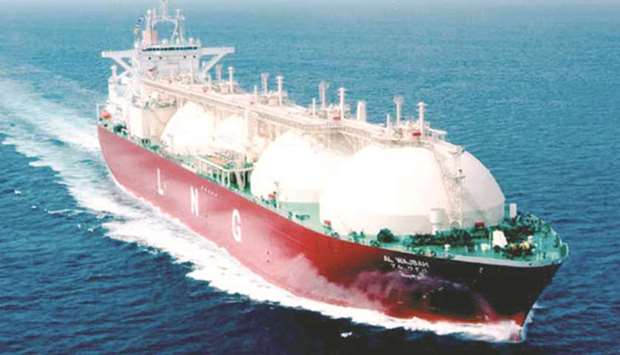Qatar's decision to enhance liquefied natural gas (LNG) production by 30% to 100mn tonnes per annum (Mta) makes "strong" commercial sense and it could lift Doha's market share in global LNG market, thus putting it in an advantageous position to negotiate with buyers, according to BMI.
"The Qatari LNG expansion makes strong commercial sense, given the deficit we forecast to form in the market in the mid-2020s and the opportunities to drive down development costs during the current down-cycle," said BMI, a Fitch company.
Qatar Petroleum (QP) recently announced its intention to increase LNG export capacity from 77Mta to 100Mta over the next five to seven years. The additional feed gas would be developed from the giant North Field, after the government lifted a drilling moratorium on the field in April.
Increasing its export capacity would allow Qatar to buoy its share in a rapidly expanding market, BMI said, adding without the 23Mta capacity addition, Qatar's share in the global LNG trade would fall from around 30% currently to around 17% by 2026.
"A large market share puts Qatar in a better position to negotiate with its buyers. Although, given the increasing diversity of sellers and rising market liquidity, it is unlikely to regain its previous pricing power," it said.
Qatar has some of the lowest LNG production costs globally due to several factors, not least the large cut of condensates and other liquid yields. It said breakeven would depend on project design.
BMI said the decision has likely been taken in response to the consensus view that from the mid-2020s, the LNG market would tilt from a surplus of supply back into a deficit.
Forecasting (in the absence of the added Qatari supplies) a deficit forming from 2024, rising to 71.5bcm (billion cubic metres) as of 2026, it said with QP targeting supply growth over the next five to seven years, the added LNG would be well-timed to plug this shortfall.
With the LNG market firmly in a down-cycle and with few new investment decisions being taken, the company is well-placed to drive down development costs in negotiations with its service providers, it said.
Although the additional capacity from Qatar raises competition for other prospective suppliers, BMI did not believe it to be a “significant” threat to final investment decisions elsewhere.
"It is probable that the added supply from Qatar will crowd out some higher cost prospective supply. But given the host of other issues being faced, it will not be the major decider of the pace or size of investment decisions on new projects. It is also worth noting that, based on our forecasts, the additions in Qatar will not be sufficient to meet the deficit, leaving open opportunities to other sellers," it said.
Qatar Petroleum (QP) recently announced its intention to increase LNG export capacity from 77Mta to 100Mta over the next five to seven years. The additional feed gas would be developed from the giant North Field, after the government lifted a drilling moratorium on the field in April.
Increasing its export capacity would allow Qatar to buoy its share in a rapidly expanding market, BMI said, adding without the 23Mta capacity addition, Qatar's share in the global LNG trade would fall from around 30% currently to around 17% by 2026.
"A large market share puts Qatar in a better position to negotiate with its buyers. Although, given the increasing diversity of sellers and rising market liquidity, it is unlikely to regain its previous pricing power," it said.
Qatar has some of the lowest LNG production costs globally due to several factors, not least the large cut of condensates and other liquid yields. It said breakeven would depend on project design.
BMI said the decision has likely been taken in response to the consensus view that from the mid-2020s, the LNG market would tilt from a surplus of supply back into a deficit.
Forecasting (in the absence of the added Qatari supplies) a deficit forming from 2024, rising to 71.5bcm (billion cubic metres) as of 2026, it said with QP targeting supply growth over the next five to seven years, the added LNG would be well-timed to plug this shortfall.
With the LNG market firmly in a down-cycle and with few new investment decisions being taken, the company is well-placed to drive down development costs in negotiations with its service providers, it said.
Although the additional capacity from Qatar raises competition for other prospective suppliers, BMI did not believe it to be a “significant” threat to final investment decisions elsewhere.
"It is probable that the added supply from Qatar will crowd out some higher cost prospective supply. But given the host of other issues being faced, it will not be the major decider of the pace or size of investment decisions on new projects. It is also worth noting that, based on our forecasts, the additions in Qatar will not be sufficient to meet the deficit, leaving open opportunities to other sellers," it said.

